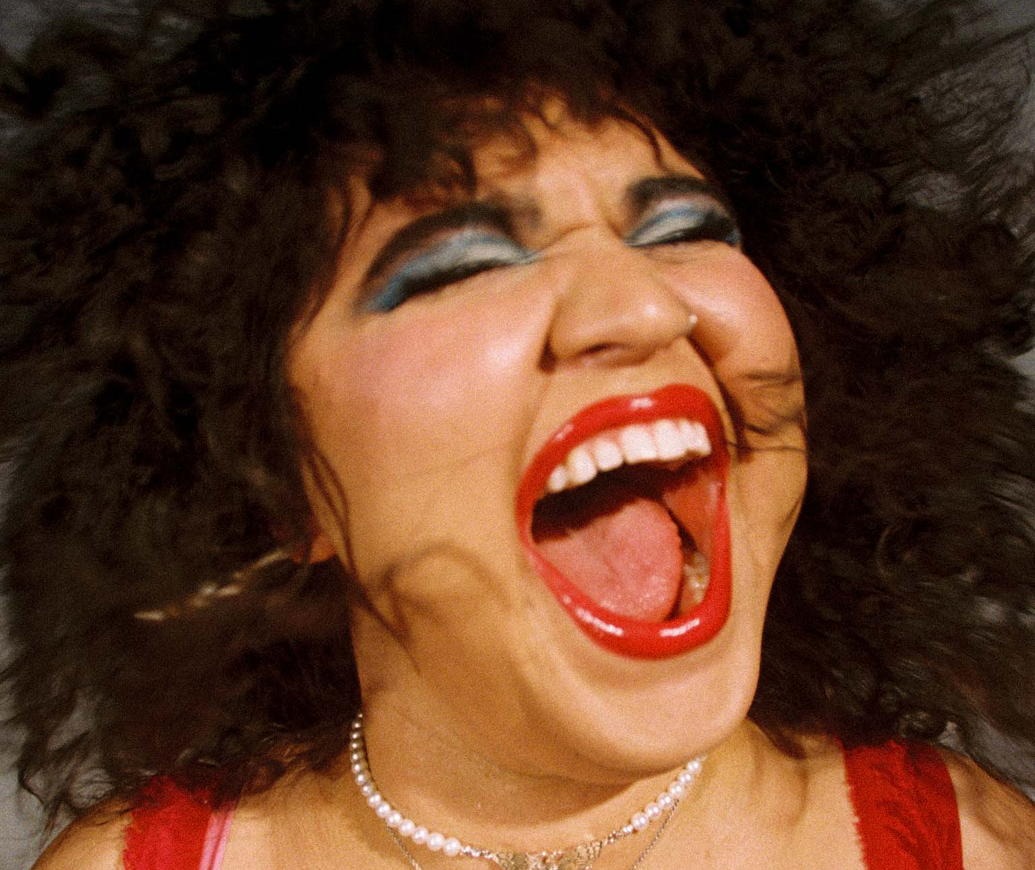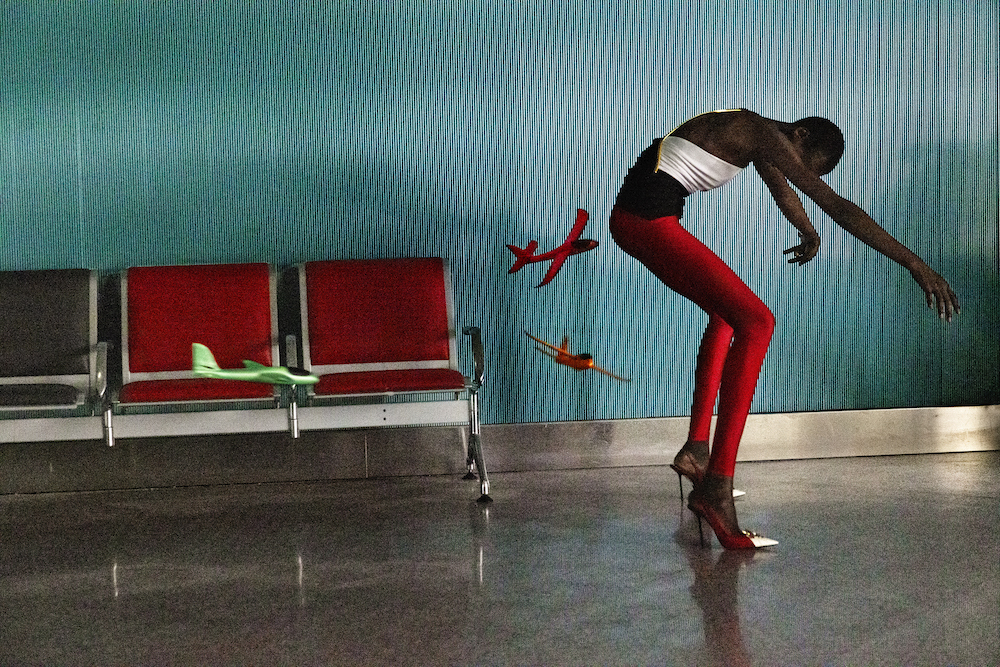Birds of a feather flock together, or so the saying goes. This tired cliché was shaken firmly awake at the 29th edition of Barcelona’s Sónar Festival, as an assemblage of characteristically experimental and innovating artists immersed themselves wholeheartedly in the innovation of others.
20 minutes after the laser-ingesting climax of her emphatic post-human performance, choreographer Kianí del Valle sat transfixed by the haunting vocals and mesmeric visuals of JASSS and Ben Kreukniet’s ‘World of Service’. At the same time, several of the lineup’s performers bore witness to algorithmic synaesthesia of Quayola/Seta’s ‘Transient’ from ME by Meliá. And basking in the caustic screams of metal vocalist Lord Spikeheart (half of Kenyan grindcore duo Duma) were Lyra Pramuk and the enigmatic experimentress that is Lafawndah.
Lafawndah has always felt an innate affinity to extremes, and to art that’s able to transcend the here and now—“I hate stagnation,” she explains when we meet again over Zoom. It’s no wonder she resonates with the kind of dystopian chaos of someone like Spikeheart. “I feel very connected to what he brings energetically,” she reflects. “I always loved stuff that was really heavy… crazy beats, crazy vocals, strong. I sometimes get surprised today by how ‘easy-listening’ music is—how soft and pillowy. It’s beautiful, it’s just not my relationship to music.”
Lafawndah’s own relationship to music is profound, and informed by a cerebral curiosity with the different traditions and techniques she’s encountered and immersed herself in over the years—from the zār music native to her father’s Egypt, to the cumbia she discovered whilst living in Mexico, and the zouk that drew her to Guadeloupe. She studied classical music, but simultaneously identifies with the spirit of punk. Her 2016 EP Tan was praised for its “danger” and “paranoiac energy”; she toured the world with the eclectic and assertive Ancestor Boy, has collaborated with Japanese electronic experimentalist Midori Takada, and last year birthed an orchestral masterpiece entitled The Fifth Season.
But none of this made it to Sónar. Instead, the unpredictable and intensely intuitive artist chose to perform new music, completed only a few weeks prior, in a live performance as theatrical as it was entrancing. Alongside her band of Sébastien Forrester, Valentina Magaletti and Alpha Maid, Lafawandah traversed the stage in jolted movements compelled by fierce percussion, as her desperate voice punctured the atmospheric haze shrouding her—with words plaintively adept: “I lost it in the fog.”
The echoes of her aching vocals still reverberating in my head, I caught up with Lafawndah to reflect on Sónar and her performance of Snug Harbour—a selection of seven unreleased tracks.
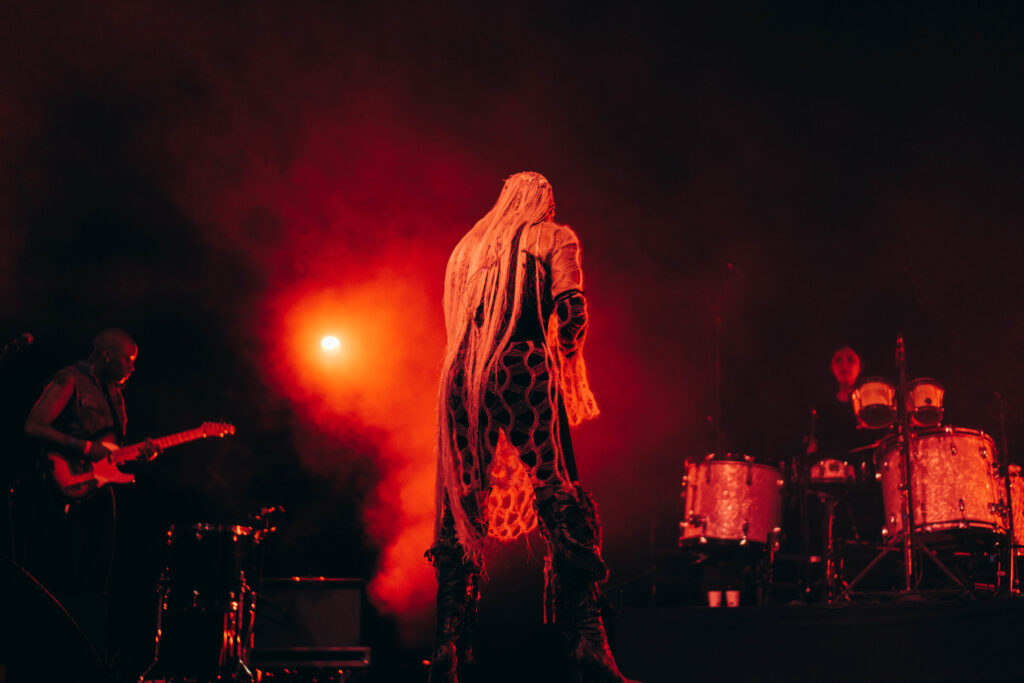
HARRIET SHEPHERD: Congratulations again, how are you feeling now the dust has settled?
LAFAWNDAH: I think the show at Sónar was such a high that I now have to find other ways of being in the world that feel as satisfying…
HS: It was so emotive. Normally after I see a live performance, I go back and almost ritualistically revisit the music as a way to process it. It was strange not to be able to do that—I just have the memories and like, three videos on my iPhone. How is it to perform for an audience that doesn’t already know the music?
LAFAWNDAH: I feel like I’m not really used to playing my music to an audience that know it—that’s never really been my relationship to live. It would be new for me if people were singing the lyrics, that’s kind of cool. For the first time I’m really thinking about how I want to feel on stage—not just creating something in the studio and then thinking about how to adapt it. After two years of being locked inside our houses and not really being able to be together, the main question for me now is like: when I’m onstage, what kind of moment do I want to share? What is the experience that I want us to have together? We have an hour window—I see that as an opportunity. How do I want to spend that time with you? I’m really thinking about the record like that.
HS: It was kind of like watching theatre—the way we were sitting too. I still had pieces of the music in my head the day after, not knowing exactly what the lyrics were. But there was one line I think that was, “I haven’t left the bed in days”. That really stayed with me. Where were you—both physically, and mentally when you were writing it?
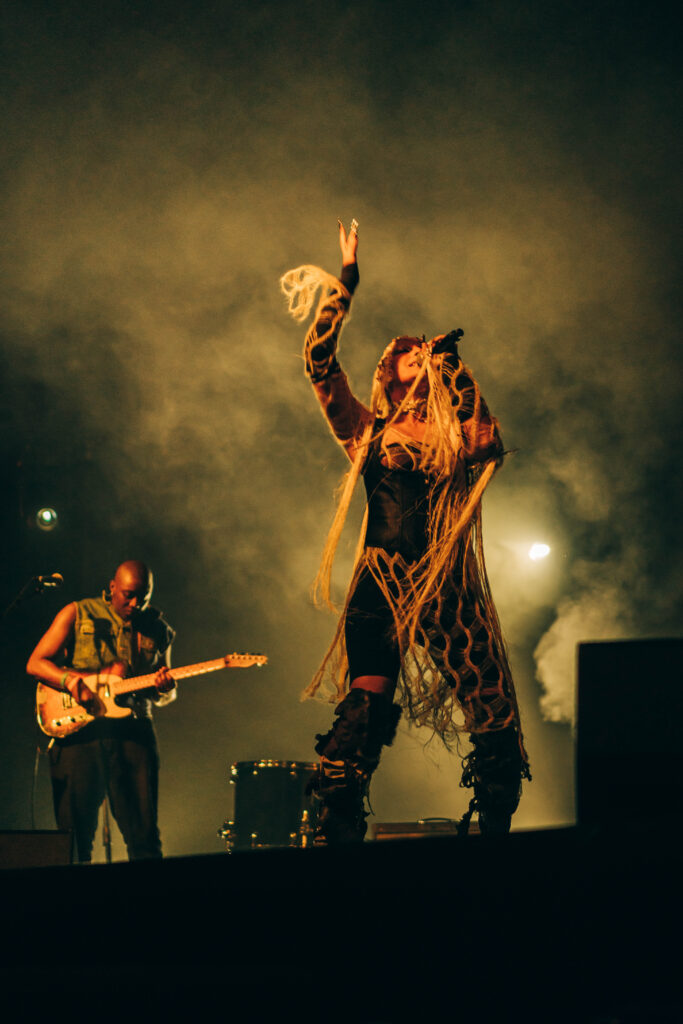
LAFAWANDAH: Physically, I was in the Cayman Islands, which is funny—that answer makes me laugh. There’s a hotel there that’s also like an artists’ residency. So you’re basically in this very heavenly place, you have everything catered to you, beautiful food, the beach, the palm trees, the little lizards. I’ve had this record in my head for a couple of years now, and when I got invited to go there, I thought: is it weird to be wanting to make something that has so much teeth, but be in, like, heaven? Is that going to get it out of me? But I think that actually these kind of setups…it’s so slick. It’s a British colony, and colonialism is so in your face—you’ll have a clubhouse that says like “COLONIAL HOUSE” where people go get drinks. You feel the tension. I think within any setup that feels so slick and perfect, there’s even more tension to tell stories of what’s underneath.
Emotionally… I mean, the past year for obvious external reasons I think uncovered so much for so many people—on very personal levels that are kind of unrelated to anything that was happening pandemic-wise. It was so tough. It was the toughest two years of my life.
HS: Were you in Paris?
LAFAWNDAH: I was in London first and then I moved to Paris for the first time in so long—I haven’t been there as an adult, I kind of escaped as soon as I could. Health-wise, family-wise, those two years, it was just like…wow. I think the record is coming out of that and trying to put it in songs in ways that are not inward-looking. I always think about songs as tools. I’m like: Ok, I went through that. And if I went through that, probably a bunch of other people went through that. So how do I start from something that happened to me, but open it out so it’s relatable.
I’ve also been thinking a lot about punk music and its function at the time, and what the equivalent would be today. I’ve been thinking about what my contribution can be—my connection to this music which, when I was a teenager, was mostly done by straight white men, but also how it made me feel and how that feeling was important to me. What’s my take on this feeling, and how can I do it in a way that feels connected to me? I don’t want to do a pastiche of rock music or punk music or, but I know that that feeling is very important. And sometimes I just want more of that around me.
HS: When you say that you’ve had Snug Harbour in your head for a couple of years—what came first? Was it this nostalgic “punk” feeling that you wanted to harness, rather than the emotional content of the songs?
LAFAWNDAH: Yeah, it came from this intuition and from a musical interest. And also a stage interest. I thought I was going to make this record pretty much right after Ancestor Boy, but as life very often is quite beautifully written, it wasn’t the time yet. Now my musical interest and what I have inside of my heart, and what I’ve experienced, the past two years are fully aligned… I started feeling it when I was in Cairo. I have like kind of a new relationship to the place, you know, I’m half Egyptian, but I had never been alone. Just like from one day to another, I organised my trip, I booked the studio, I reached out to producers and musicians that I wanted to meet there.
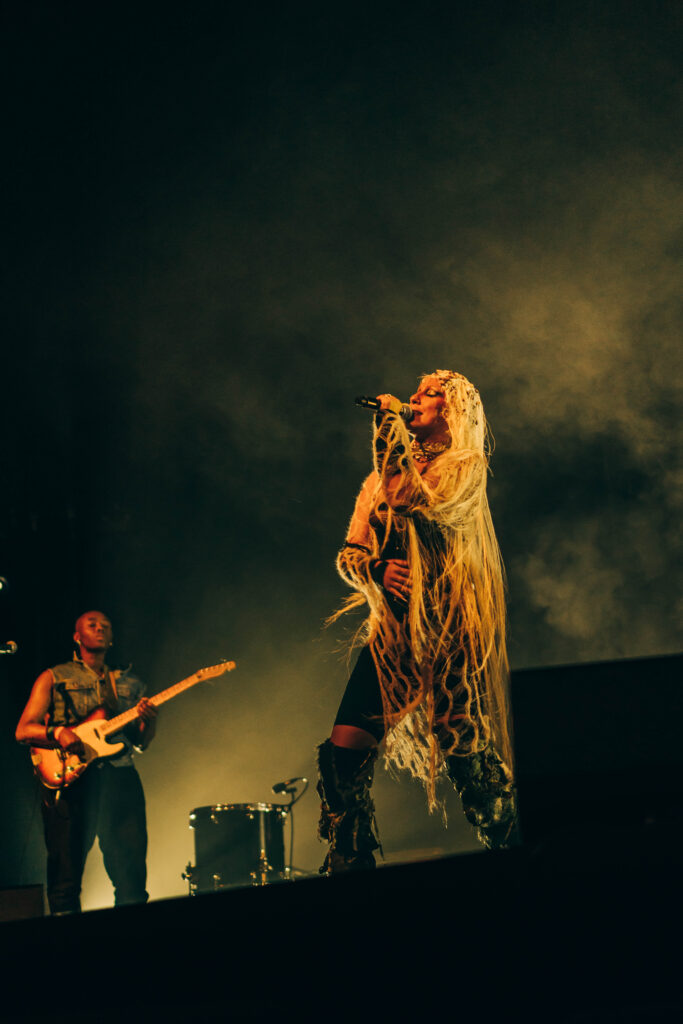
HS: Does your approach to making and performing music change a lot with each project you’re working on?
LAFAWNDAH: Yes. I don’t like to repeat the process because then you get comfortable. And you kind of know what’s going to come out of that process. I’m singing more now, and collaborating with more producers, because I don’t need to prove myself to anyone anymore—or I feel at least I don’t have to prove to myself that I compose. I know that about myself. I think a lot of women have this thing, this relationship with singing…like we have to scream so hard to show we also have these other skills, and sometimes the screaming takes over the fact that maybe I just don’t feel like doing it now. 90% of people assume that I’m just a singer, whether I’m at the heart of production or not. So that’s not really going to change. I mean Björk has the same problem after a 30 year career. I feel like I know what I can do for myself.
HS: And you said that even from its inception, you’re already thinking about its embodiment on stage…
LAFAWNDAH: Yeah for this record, I really did. This super famous actors’ coach in LA told us one day—and it sounds really basic, but it’s really helpful—that the critical mind should not be invited in the room at the same time as the creative mind. One has to be left at the door. I’m learning this in a very visceral way. This time, instead of composing, I would take the mic and pretend to be on stage, and just start singing the words. That’s a very different approach for me. It kind of gives a totally different energy to the music and I think you can hear it. I think that’s also why the energy on stage feels so, like, direct. It felt so good because they’re not words or melodies that came from a critical mind, they just came out.
HS: When can we see it on stage again?
LAFAWNDAH: Next year. I’m planning to tour it in 2023/24, to coincide with when the new music that I’m writing comes out…
Sónar will celebrate its 30th anniversary in 2023.
Photographs courtesy Sónar

